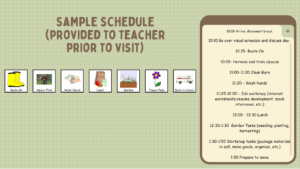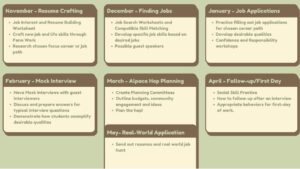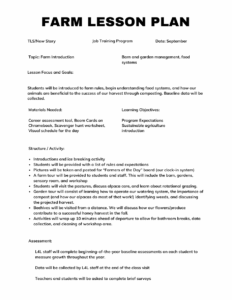Final report for YENC23-196
Project Information
Learning 4 Life Farm is creating a 7-acre sustainable farm with organic gardens and therapy alpacas to provide job training and animal assisted alpaca therapy for youth on the autism spectrum. Program participants will care for the alpacas; plant and maintain the gardens; sell produce and products they create and learn Sustainable Agriculture practices and transition life skills. Participants will gain hands-on experience in rotational grazing, sustainable livestock management and regenerative agriculture. Our objective for this proposal is to staff our alpaca program, providing staff wages for a portion of the program.
- Provide transition job training in a sustainable organic farm setting for youth ages 14-25 on the autism spectrum in central Ohio. We expect to serve 100 job training participants per year.
- Provide animal assisted alpaca therapy to improve quality of life for people ages 3-25 with ASD and other disabilities, serving 275+ clients per year. Our animal assisted alpaca therapy program would be one of only a few in the world specifically tailored for autism.
- Participants will gain hands-on experience in sustainable alpaca management, managed rotational grazing, and regenerative agriculture.
Educational & Outreach Activities
Participation Summary:
Learning 4 Life Farm supplies a monthly newsletter to subscribers via MailChimp. Several presentations have been conducted both on and off site, including during fundraising events and open hours during months of flower and produce harvest. Directors have attended local summer programs and schools. Groups that have attended our farm include school field trips, 4 H meetings, and Scout troops.
Learning 4 Life Farm directors have attended numerous outreach events including fundraisers at local restaurants, Educational Service Center of Licking County events, car shows, and markets. Upcoming events include the Empower Summit in Columbus, where we hope to raise awareness of our programs.
Ongoing outreach via social media is conducted a minimum of 2- 4 times per week. Directors have contacted all public schools in Licking County regarding available programming and hope to obtain contracts moving forward in surrounding counties. Current program contracts are in place with New Story Columbus, The Learning Spectrum (all locations), and Licking Regional ESC, with plans for expanded contracts for the 2025-2026 school year.
- Host webinar or in-person workshop
- Series of short videos and/or social media posts
Learning Outcomes
livestock care
8 out of the 9 students surveyed in their most recent visit to the farm indicated that their mood/overall well-being had improved from their arrival to the farm to their departure. Students reported feeling more confident, proud, and inspired
- Confidence
- Independence
- Improved well-being
- Communication
Our Objectives (updates in italics)
- Establishment of the Learning 4 Life Farm alpaca program in 2023, an educational on-farm job training program for 100 participants on the autism spectrum ages 14-25 per year, and development of animal-assisted alpaca therapy for people ages 3-25 with ASD and other disabilities, serving 275+ clients per year.
- We did not reach the 275+ students originally intended but did work with 100-200 students over the past 2 school years. The “therapy” was cut short by resignations, but animal assisted learning continued and was quite successful.
- Through our alpaca care program, build both participant hard job skills - providing animal care, cleaning the barn, assisting with rotational grazing of alpacas, etc. - and soft job skills including following directions and multi-step instructions, social interaction and more -- skills that lead to success in the workplace and increased independence. Measurement tools include skills logs and reports.
- Student’s work daily with all our animals and learn throughout the school year how to take care of them and to work through tasks to completion.
- We anticipate 5 young adults with ASD will obtain meaningful jobs in the community in 2023 upon completion of our pilot job training program.
- 8 students who participated in our program obtained jobs.
- Improved quality of life through increased social interaction, time in the community, sensory regulation and communication and decreased problem behaviors, autistic severity, and stress for 275+ annual animal assisted alpaca therapy clients with ASD ages 3-25, consistent with research-based outcomes for animal assisted therapy with ASD. Measurement tools include clinical session logs, participant, staff and family surveys.
- Clinical logs were not completed due to resignations, but self-reported data indicates improved quality of life while at the farm.
Lesson plans and programming was developed by Learning 4 Life Directors. See below for discussion of lesson plans. First, here is a sample visual schedule of a farm visit as well as the calendar of our job training program:
Job training curriculum:
As a unique facility with specialized programming, an existing curriculum has not been created that would fit the needs of our students. We have designed our own curriculum based on the specific animals on our farm and our garden space with the needs of our participants in mind. Our curriculum is ever changing as we evolve and reach more participants. We have received positive feedback, and plan to offer additional training opportunities to students as well as the community as we grow. Our students and teachers who attend our programs report the need for as many hands-on activities as possible during their time here. During the winter months, we have supplemented classroom-based learning to better prepare our students for the workforce and to broaden their understanding of sustainably grown produce, and animal care.
Project Outcomes
There have been many changes with the organizational structure and support of Learning 4 Life Farm since the application for this grant in early 2023. Amy Hurst resigned her position in fall of 2023. Jamie Kemp and Amanda Tompkins were hired on to replace Amy’s position in October of 2023. Jamie Kemp is the Director of Operations and Amanda Tompkins is the Director of Education. The Learning Spectrum(TLS) was sold to a larger school called New Story in October of 2023. The TLS social worker hired to administer the animal assisted therapy resigned in December 2023, Molly Bochenek(TLS) who oversaw the animal assisted therapy resigned in January 2024. Throughout all this transition, Jamie and Amanda continued running the classes and working with the students in both the gardens and with the Alpacas. During spring of 2024 the farm acquired 2 barn cats and 2 indoor rabbits to further enrich the animal assisted learning for our students. Spring/summer of 2024 an Agricultural/Farm educator was hired to promote our students’ learning opportunities with the animals and the gardens. The 2024/2025 school year saw two more schools attend the farm. A class from New Story and a class from the Licking County ESC, Granville school have been new additions to our existing three TLS middle and high school classes.
At Learning 4 Life Farm, we celebrate all student progress, both big and small. Students who initially enter our program disliking barn smells, working in the dirt, or the outdoors in general are our favorite to work with, because the progress they make is significant.
A middle school student currently attending our Job Skills program is the star of one of our favorite stories. When he first began working with us, he was terrified of the alpacas, did not like the smell of the barn, and loudly refused to participate in any tasks. Our solution was to meet him where he was at the time, and that included purchasing toy alpacas and kinetic sand for him to work with inside our workshop while his classmates cleaned the barn. With every subsequent visit to the farm, he began to participate more and more. He was first coaxed out to the barn to read to the alpacas, he then would sweep the floors for short periods of time, and now he is able to work for up to 10 minutes at a time in the barn before requiring a break (which he now takes in the barn!).
Many students attending our programs do not enjoy the idea of getting their hands dirty in the gardens, even if gloves are offered. Our solution is to accept “no” for an answer. Over time, they see their classmates digging in and they witness tangible growth through their efforts. Most will, in time, voluntarily jump in to help with weeding, planting, and harvesting.
The percentage of children being diagnosed with autism continues to grow each year, with no known cause or cure. Early intervention is a child’s best chance for success and supporting this demographic in obtaining not only valuable work skills, but opportunities to take in fresh air and learn about our food system is invaluable. These children and their caregivers require support now more than ever as the population continues to grow. We believe that these children and young adults have much to offer the world with appropriate accommodations, and deserve the best possible support required for obtaining gainful employment. The need is significant, and interest in sustainable agriculture continues to grow.


